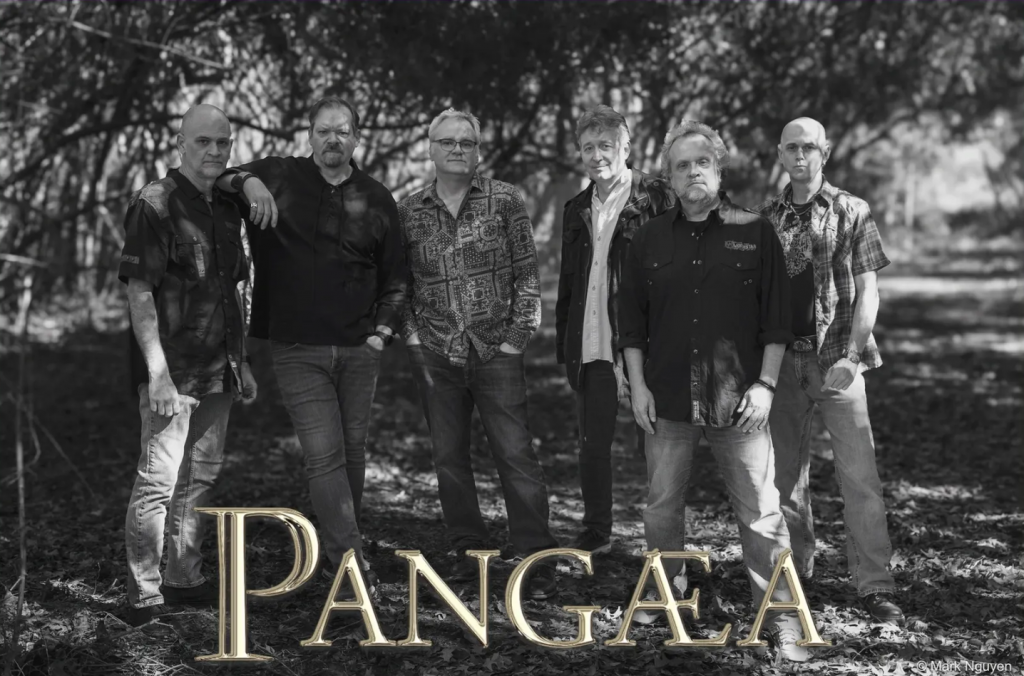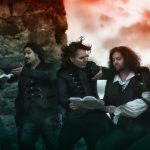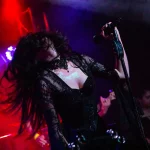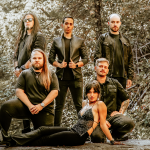We talk to founding members and brothers Corey Schenck (keyboards) and Andi Schenck (drums) about prog rock/melodic rock band Pangaea, who just released their new album “Beowulf” in May of this year on their label HMG.
For over 35 years, Pangaea has been creating music that intrigues the mind and inspires the soul. Since their formation in 1989, they have garnered interest in over fifty nations across the globe. The band’s tight, melodic ensemble playing, highly proficient level of musicianship and excellent songwriting and singing are reminiscent of prog rock’s classic era while also showcasing the band’s modern era sensibilities.
The band was formed initially as Artica in 1989 in Tulsa, Oklahoma, by Corey and Andi Schenck, Ron Poulsen, Darrell Masingale (guitar/vocals) and Keith Tinker. Lead vocalist Steve Osborn joined the band in 1991, establishing the lineup that would become Pangaea.
The concept for the band was to create a sound based on the classic rock and progressive rock of the past while utilizing modern sounds and styles. The idea was simple: amalgamate memorable melodies; rich harmonies; powerful rhythms, and other musical elements into compact song structures.
The band performed in 2008 at a Houston Dynamo soccer match before 12,000 people but after that show, the band went on an extended hiatus that lasted 15 years.
Eventually deciding to reform in 2023, the band added multi-instrumentalist Scott Draughon to its classic lineup and recorded the new album, “Beowulf,” with Robert Berry back on board as producer. The first single from the album, “Tomorrow Will Come,” was released in April. The second single, “Necromancer,” was released in May.
Today, Pangaea is:
Ron Poulson: Bass
Steve Osborn: vocals
Darrell Masingale: Guitar/vocals
Scott Draughton: multi-instrumentalist
Corey Schenck: Keyboards
Andi Schenck: Drums
With all this in mind, we began talking to the brothers about the new album. As we all love history here at the magazine, the album title “Beowulf” seemed like a good place to start. “Beowulf” was an Anglo-Saxon hero; the whole tale is contained in an old poem. It is all great material about monsters lurking in the marshes and mists and the great halls of Saxon England, complete with storytellers and open fires.
Andi: I was writing a percussion piece for this album. I had a lot of ideas for it and I was drawing some of the feeling from an older Phil Collins style of vibe, I was going for that mysterious, airy feel to the piece. But I also wanted to incorporate some of the history of the band. We have a lot of guys with some Native American roots within the group. It varies within the band, but our family leans back to the Comanche tribe. There is a piece in the song that includes a Native American chant and that is from a Comanche chant that they call the ‘Men’s Song.’ So it’s not necessarily claiming that you are a man, it’s a traditional chant for the Comanche. So the title for the track was originally the Comanche for bear, ‘Wasape’ and that was the feel I was working on for the piece. Connecting this to the native American belief of the bear, a representation of resurrection that they draw on from a bear’s hibernation in the winter. There is this sense of an undefeatable beast, as in their world they come back, they kind of resurrect in the spring. I was drawing on those traditions, and then I had the lyrics for the chorus that I was working on with Corey and Ron. The three of us were in the room when I introduced a piece that I had and my chorus lyric was “I’m a Man,” and I was coming into a shape shifting, Native American vibe, bridging in the Comanche. As we sat there working on the lyrics, Corey drew the Beowulf image into it.
Corey: The album cover was already being worked on at this point. Andi had a vision where he was in a field with a huge bear walking with him. He gave this to our artist, Rainer Kalwitz. With the different connections, it just popped into my head. When shapeshifting comes into play, the old Norse tales of the beserkers and the whole myth of Beowulf. Beowulf means ‘be a bear’ so I thought about using the Beowulf poem as the basis of the verses. Our bass player, Ron, was happy to go ahead with this, so I got a copy of the book with the translation. I showed it to them and we selected a few verses from the poem, then called Steve Osborn our vocalist. I’m unsure what he thought at first, but Steve is a trained opera singer and he is great at languages. I gave him the stanzas and we watched some videos of experts reciting the poetry on stage. He studied the pronunciations and he set it out, presenting the poem in the way you hear on the album.
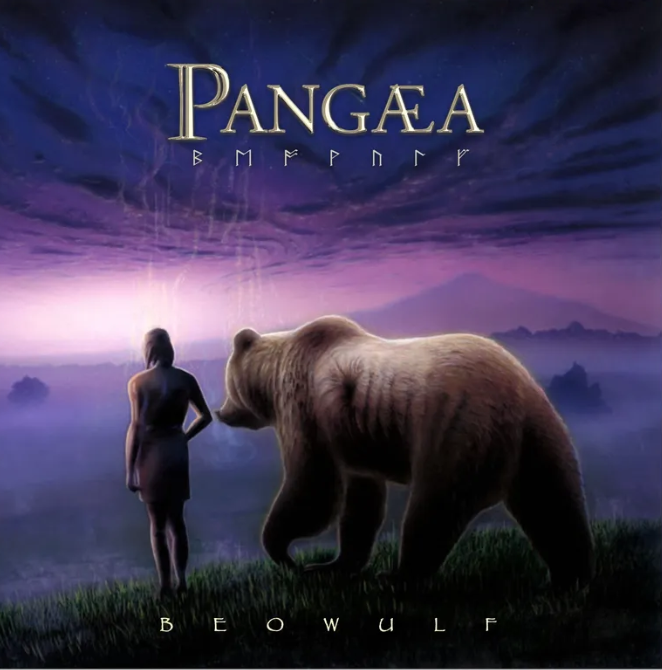
It’s all fascinating—the Saxon world of monsters, darkness and flickering candles. Let’s also note the great covers by the band for their album. Our favourite here is “Welcome to the Theatre,” a 1997 album cover from the days when vinyl records were covered by works of art! The album is great, but Pangaea have had quite a sleep from activity, 15 years in fact. The business has changed a lot in 15 years, and the consumption of music has changed so much. We wanted to know if there was a difference in the band today as to when they slept and why now was the right time to return.
Corey: It was a group agreement to return. The five of us had always been in contact, three of us live in Houston, Texas, and the others live almost 500 miles away. We always stayed in touch through the odd text, email, or call and in 2019, we started talking more seriously. In 2021, we decided to meet halfway in Dallas, Texas. Andi and myself, Ron, and Steve came down from Oaklahoma and we sat and talked for a few days. Everybody wanted to do it again, and as the saying goes, “Life is what happens while you’re busy making other plans,” so we had all been busy over the years. People had gotten married, worked on careers, or whatever. But we had really missed each other, we are truly all like brothers and we love playing music together. We knew if we were doing this, it had to be the five of us. It had to be us. We got together, began playing some of the older music and rehearsed. Shortly into those rehearsals, which were for about a month because of the distance, I brought in some new songs, as did Andi, Steve and Ron, so we got excited about a new album, and that quickly became the focus. Now we are rehearsing and doing shows with the old tracks, as well as the Beowulf tracks. We like playing together. We have all tried playing live with other people, but the chemistry was different, it wasn’t THE band.

Andi: Noting the point you made about the change in technology, we took this break but every individual in the band continued in music in one way or another. Of course, when we recorded the first Pangaea tracks ever, we were on tape, recording the old studio way. It wasn’t until the third album that we were mixing digitally. We started on analogue and tape and we did love that sound, but even after the 15 year break, music stayed. Corey is a professor of music, he teaches composition and theory. He also teaches courses on the music business. Darrell Masingale continued performing, he was a hired gun, playing for lots of bands in the Houston area, and keeping up with the technology in the changes in live sound. Everything became mixable on the iPad instead of this huge console. Ron was also a hired gun for national touring acts, giving them a bass or back guitar, whatever they needed. Steve Osborn continued his opera and music education, so all the guys were in music as a career. As for myself, with our producer, Robert Berry, I did a couple of projects. I did a blue-eyed soul Simply Red vibe with him. I also worked on an electronic project called “Glass Shadows” with Rico Schenck. So we all stayed musically as it is in us. We were not together, but keeping parallel. This was the right time to return, however.
The new single “Tomorrow Will Come” does seem to showcase how melody is at the heart of the songwriting, the chorus hook and the memorable tune. It shows the importance of melody in the band’s material, we think.
Corey: All of our songs, from that first album in 1996 to now, have a melody. We are all songwriters and we believe as a prog band that it is more about the songwriting than the chops! Can you all play 16th notes together, or whatever. We can play super fast, but as a writer, the melody will often come first. When it comes to the lyric, I will often compose the melody for the lyric. Then the music is brought to the band and everyone puts their stamp on it, whether it is largely complete already, or just a small idea. As a band, we follow the music and we will develop a song as far as the song wants to go. So on “Necromancer,” for example, that is nine minutes long, but “Month of Sundays” runs at just over two. That is all the song needed; the song is done. We don’t work with a frame that we always have to fit. We follow the music to where it wants to take us.
We remember talking to Gene Simmons and him talking about when Kiss auditioned guitarists, and they were sometimes playing so fast the notes would just fall out but it became like an angry bee, and you just wanted to shoot the f thing after a while. That’s why he felt the Beatles were so good in their day, and now. They use the melody and the hook so well.
Corey: The Beatles were masters at that, of course. Also, The Stones. We feel you can take any of our songs from any album, and if you can’t sit down and just sit down with an acoustic guitar and voice, or piano and voice, and play that song, you don’t have a song; you have a showcase of skill and chops. We like to think we can do an acoustic version of all our music.
The band did a series of acoustic shows before their break.
Corey: Yes, right before the break. We recorded some music with the full band, then we went out with our manager/producer and we did some shows in Hollywood. Our manager had a cool idea for a double market for the electric show and the acoustic show. We stripped everything down and recorded some of the songs that way, doing a five song version of the tracks. Then we would play book stores and so forth. A good song doesn’t require all the extras—a great melody and a solid hook.
We also remember chatting with BB King’s daughter, Shirley King, who commented on how songwriting develops with age, lived experience and the blues. As you grow older, you infuse more of yourself and those lived experiences into your music. Do the guys feel that their approach to songwriting and narrative has changed due to these factors?
Corey: I do for my songs, and from the start, I always wrote songs from experience. On this current album, my songs are all that way. As I have lived more years, I have more to build on, and looking at that song, “Tomorrow Will Come,” that was a song about loss and people in my life and the band’s life who we have lost and who passed away. It is about taking a more positive view of that, as we all experience it. It is a choice to let the weight weigh you down or to manage it. I don’t think I could have written that song at the start, but as you experience things, you use them.
Andi: I’m not one of the main writers, but in my contributions, you are correct. When we talked about doing this album, I looked through my old lyric sheets that I found in a box and I thought, ‘Oh my God’ these are so horrible and immature, I couldn’t relate to them anymore. Fifteen years ago, it was too far out. Now I do infuse some more of that maturity—the blues of it—into my music.
Corey: Some of the songs on the album are therapeutic. The last song, “A Month of Sundays,” is about suicide, as several band members have experienced it with people close to them. Steve and I approached that song based on those experiences and awareness.
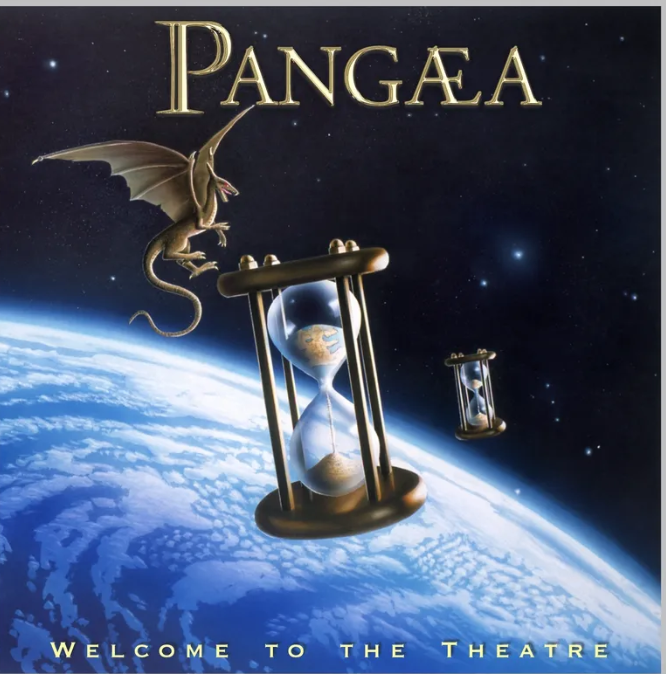
Turning to drums for a moment, we wondered how Andi approached the drum solo. We often think that jungle drums are so exciting that you switch in immediately. Or listening to the Indian tabla drums within the music of Nusrat Fateh Ali Khan is very exciting too. However, someone up there on stage belting those rock drums for however long has to be got right or it can drag. How does Andi approach them?
Andi: I like that question! I don’t approach the drum solo with loaded chops at a hundred miles an hour. Sure, it can blow your mind, but I don’t particularly like doing drum solos. The guys used to force me to when we were younger, but I’m not keen now. I have learned, as an approach, the tribal grooves, and I have tried to incorporate that into our sound. Two of my big influences were Phil Collins and Terry Bozzio. I went to a Bozzio clinic, and when it was just him and his kit, he was creating moods. I appreciate that. Corey pushes me as a drummer, he pushes me to play in different time signatures at the same time, so he challenges me. But in the solo, I lean more toward the groove and looking forward, I would like to see the band out supporting this album more and have a bridge that supports the ‘Wasape” track. I saw one show where a drummer was doing single stroke rolls across his drums endlessly and the crowd was going bananas, but I knew the drummer was doing nothing at all!
We think drums root and anchor the music, but they don’t have to lead. Ringo Starr only did one drum sole and that was at the very end of “Abbey Road.”
Andi: You don’t serenade a woman with a drum solo! A guitar, a voice, a piano—yes. Even a bass guitar. But I can’t set up outside her house and woo her with a drum solo.
Finishing on two quick fun questions, what was the last album the guys listened to from beginning to end?
Andi: I was setting up my studio and listening to “Home” by Simply Red.
Corey: The last thing I listened to from beginning to end was amazing. It’s a piano based album called “Fantasia” by Yuja Wang. It is truly wonderful.
Andi: We have diverse tastes. Ron would probably have pulled out “Destroyer” by Kiss. Darrell Masingale would possibly have been playing Rush “Moving Pictures.”
And, lastly, which artist, alive or dead, would you most like to have seen live?
Andi: Genesis, from the “Genesis” album through “Duke.”
Corey: The Beatles, around the time of “Rubber Soul” and “Revolver.”
We hope you liked the feature, dear reader! If you did, please check out the other pages of the magazine; we have many great features, merchandise, editorials and even poetry! We work hard for you, and if you want to show some appreciation and support what we do, then do use the Support Us link below! Always appreciated.
By Mark C. Chambers
and
Lorraine Foley
